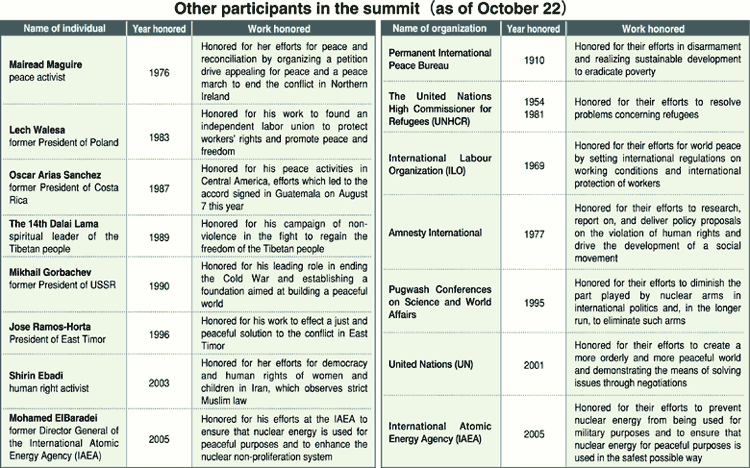Invest in people's spiritual activities
1) What do you feel is the significance of holding the summit in the city of Hiroshima?
The people and city of Hiroshima, the victims of the world's first atomic bombing, play unique, and uniquely important, roles on the world stage. The very word "Hiroshima" communicates the imperative of abolishing these genocidal weapons.
The courageous efforts of the Hibakusha; the city's peace community, and city leaders like Mayor Akiba who initiated the Mayors for Peace Vision 2020 campaign have provided the vision, and the inspiration, for people everywhere to work to secure humanity's future through the abolition of nuclear weapons.
Holding the summit in Hiroshima will encourage the Nobel Laureates to issue an urgent call for complete abolition. The site will add resonance to that call as it circles the world.
2) How would you describe the conditions of peace?
Peace is not simply the absence of war. Peace requires the presence of justice and respect for the dignity of each individual and of each of the world's diverse cultures.
While tensions are necessarily a dimension of the human experience worldwide, societies of peace commit to resolve conflicts that arise from tensions nonviolently, by means of respectful dialogue and negotiations.
Peaceful societies do not waste their precious resources maintaining vast militaries. They do not pursue their ambitions by means of military threats. Instead peaceful societies ideally invest their resources in meeting essential human needs on an equitable basis; in creating environmentally sustainable and dynamic economies, and in affirming humans' spiritual dimension in many ways, including support for the arts.
3) What do you think must be done to create a peaceful world free of nuclear weapons and war?
The most essential step to creating a world free of nuclear weapons is for the world's nuclear powers to meet both their diplomatic and moral obligation by fulfilling the Nuclear Non-Proliferation Treaty commitment to negotiate a nuclear weapons abolition convention. This can be done in a manner that ensures abolition within the next decade, as Mayor Akiba has correctly stressed.
We simultaneously need to work within our respective societies ? block by block, city by city, state by state, prefecture by prefecture - to halt the modernization of all nuclear weapons and to sharply cut military spending.
In the United States we have a saying, "When the people lead, the leaders will follow." We all must lead people in our societies by helping them understand that building prosperous, sustainable economies cannot be achieved when our precious and all too limited national and cultural resources are devoted to militarism.
4) What do you think junior high and senior high school students, like us, can do to promote a peaceful world?
There is much that young people can do. First, you can study history thoroughly and bravely. That history for you would include the history of Japan's military aggressions; the current and ongoing U.S.-Japan military alliance, and the presence of foreign military bases in Japan. You can examine how those facts may have undermined the peaceful and prosperous development of Japanese society.
You can invite Hibakusha, others who have worked for peace and foreign guests to your schools and community forums where you and your peers can learn from their experiences and vision.
If possible you can travel to other countries to learn about their societies. You also can create Internet paths to talk with and learn from people in other countries.
You can discuss and discern ways to work for greater equality, justice and mutual respect within Japanese society. You can work to alleviate poverty at home or abroad.
And finally, you can help others in need, be they aging Hibakusha, refugees, or victims of wars and natural disasters.
5) What would you like to focus on at the summit in Hiroshima?
The team from the American Friends Service Committee will focus on the urgent need to completely abolish nuclear weapons by 2020, and simultaneously, make drastic cuts to the world's military expenditures, so that the nations of the world can devote their resources to meeting human needs.















